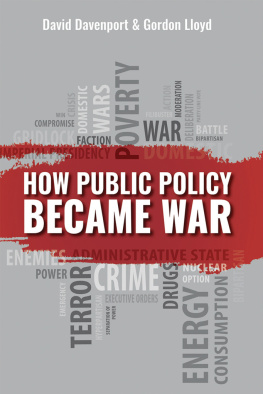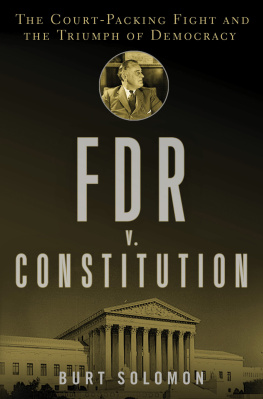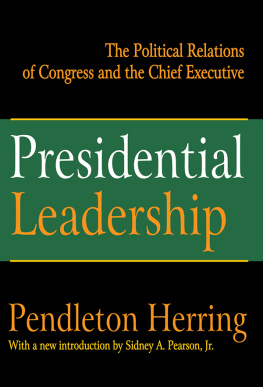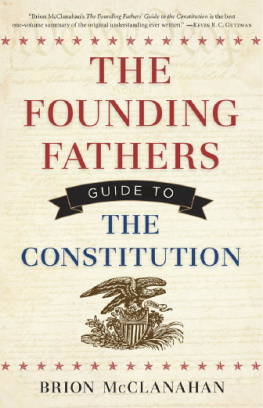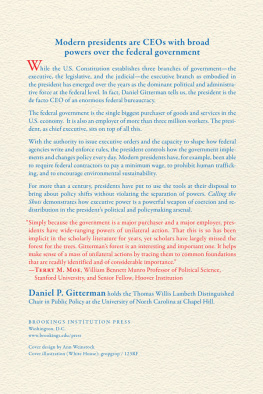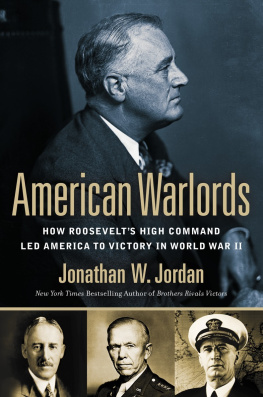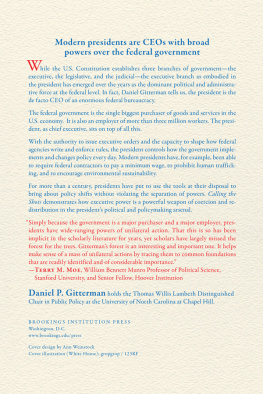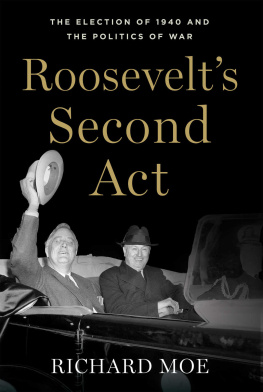ADVANCE REVIEWS OF
How Public Policy Became War
When pondering meditatively cloud banks in the sky, one might yet be surprised when a fellow observer draws alongside and points out intriguing formations that one had not noticed. So might one respond to the third in the Davenport-Lloyd trilogy on US politics, How Public Policy Became War. They have pinpointed habits of thought and expression that meaningfully illuminate contemporary discourse. In doing so they vindicate their observation that if we learn nothing else from the American Founding, it is that in the end it is the character of the people and the quality of the institutions that are the keys to the success or failure of the American experiment.
W. B. Allen, Dean Emeritus, James Madison College, and Emeritus Professor of Political Science, Michigan State University
F. A. Hayek famously described how the market order (catallaxy) expands the boundaries of human society by turning strangers into friends, or at least trading partners. In their exploration of the expanding treatment of public policy as war, David Davenport and Gordon Lloyd help us to understand how modern politics and statesmanship has worked in the opposite direction, diminishing society by turning our neighbors into potential enemies. The war metaphor shapes the very ways we can deliberate about public problems and ultimately pits us against nature and the constraints of our own humanity. This book offers timely insight and a call to citizens to disarm and work together to improve the institutions of self-governance.
Lenore T. Ealy, Secretary and Executive Director, The Philadelphia Society
David Davenport and Gordon Lloyd see 1933 as the year that changed everything, and not least the language of governing. They trace the phases by which war became our default mode, not only for elections but for the policy making in between. Both penetrating and persuasive, they show how this mind-set has undermined the deliberation Congress was once imagined to provide. The authors also remember to offer ideas for restoring the legislative process to health and to the function the founders intended.
Ron Elving, NPR News, and Professor, American University School of Public Affairs
The American constitutional order was designed, as James Madison told us, so that the cool and deliberate sense of the community might prevail in our political life. This book is written in the spirit of Madisonian deliberation and provides an important antidote to the warlike atmosphere that has too often prevailed in Washington for some four score and seven years.
Christopher Flannery, Executive Director, The Ashbrook Center at Ashland University
Metaphors matter, especially in a democracy, because they are the carriers of large and consequential ideas. As David Davenport and Gordon Lloyd demonstrate in this crisp and compelling study, the United States has paid an enormous price for our reflexive resort to the word war to describe any and all important government actions. Its promiscuous use has gone hand in hand with the cultivation of a constant state of national emergency and the creation of a veritable army of crises that can never be allowed to go to waste. It has provided essential support for the steady growth of the administrative state, and has greatly contributed to the decline of our discourse and to the enervation of our capacity for democratic deliberation. It is time to kick the habit, give peace a chance, and entertain other and better metaphors to galvanize and guide our actions.
Wilfred M. McClay, University of Oklahoma
Ideas have consequences in politics and policy, but so do words in shaping public opinion. In this important book, Davenport and Lloyd invite us to consider how the word war has been used by public leaders to effectively quash deliberative policy making on an array of issuesforeign and domestic. In this polarized era, Davenport and Lloyds concern about political rhetoric is more important now than ever.
Pete Peterson, Dean, Pepperdine School of Public Policy


With its eminent scholars and world-renowned library and archives, the Hoover Institution seeks to improve the human condition by advancing ideas that promote economic opportunity and prosperity, while securing and safeguarding peace for America and all mankind. The views expressed in its publications are entirely those of the authors and do not necessarily reflect the views of the staff, officers, or Board of Overseers of the Hoover Institution.
www.hoover.org
Hoover Institution Press Publication No. 700
Hoover Institution at Leland Stanford Junior University, Stanford, California 94305-6003
Copyright 2019 by the Board of Trustees of the Leland Stanford Junior University
All rights reserved. No part of this publication may be reproduced, stored in a retrieval system, or transmitted in any form or by any means, electronic, mechanical, photocopying, recording, or otherwise, without written permission of the publisher and copyright holders.
For permission to reuse material from How Public Policy Became War, ISBN 978-0-8179-2264-1, please access www.copyright.com or contact the Copyright Clearance Center, Inc. (CCC), 222 Rosewood Drive, Danvers, MA 01923, 978-750-8400. CCC is a not-for-profit organization that provides licenses and registration for a variety of uses.
First printing 2019
25 24 23 22 21 20 19 7 6 5 4 3 2 1
Manufactured in the United States of America
The paper used in this publication meets the minimum Requirements of the American National Standard for Information SciencesPermanence of Paper for Printed Library Materials, ANSI/NISO Z 39.48-1992.
Cataloging-in-Publication Data is available from the Library of Congress.
ISBN : 978-0-8179-2264-1 (cloth. : alk. paper)
ISBN : 978-0-8179-2266-5 (epub)
ISBN : 978-0-8179-2267-2 (mobi)
ISBN : 978-0-8179-2268-9 ( PDF )
Introduction
Any way you look at it, 1933 was an important year. Globally, Adolf Hitler became chancellor of Germany and opened the Nazis first concentration camp, at Dachau. At home, a major drought in the Midwest created a Dust Bowl that pushed families into new migration patterns across the country. The Great Depression hit its worst year, with one in four Americans out of work. Franklin D. Roosevelt replaced Herbert Hoover as president and immediately closed the banks in an effort to stem a panic of cash withdrawals. The first one hundred days of Roosevelts New Deal in 1933 ushered in the most revolutionary set of domestic policies in American history. In an apocalyptic message, Roosevelt proclaimed, the mechanics of civilization came to a dead end in March 1933.
This is now our third book that grows from the soil of 1933. We have come to believe that 1933 was not just an important year, but was also a turning point, a hinge on which history turned. In our first book together, The New Deal and Modern American Conservatism: A Defining Rivalry (Stanford, CA: Hoover Institution Press, 2013), we claim that both modern American conservatism and liberalism were born in 1933 with the launch of the New Deal, which we believe was Americas French Revolution, changing everything. In our view, the New Deal versus modern American conservatism was the defining rivalry of the 1930s but also today, and we can better appreciate and participate in todays policy debates by understanding that.

